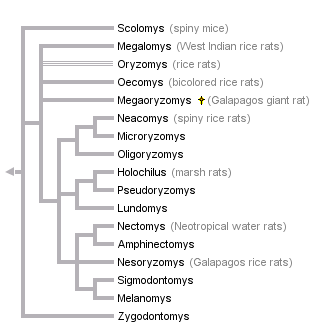Oryzomyini
Rice rats, spiny mice, marsh rats



This tree diagram shows the relationships between several groups of organisms.
The root of the current tree connects the organisms featured in this tree to their containing group and the rest of the Tree of Life. The basal branching point in the tree represents the ancestor of the other groups in the tree. This ancestor diversified over time into several descendent subgroups, which are represented as internal nodes and terminal taxa to the right.

You can click on the root to travel down the Tree of Life all the way to the root of all Life, and you can click on the names of descendent subgroups to travel up the Tree of Life all the way to individual species.
For more information on ToL tree formatting, please see Interpreting the Tree or Classification. To learn more about phylogenetic trees, please visit our Phylogenetic Biology pages.
close boxTree based on Weksler (2003), Steppan et al. (unpubl. data), Dickerman (1992), Steppan (1995, 1996), Voss and Carleton (1993), Dickerman and Yates (1995), and Myers et al. (1995).
Discussion of Phylogenetic Relationships
Resolution of oryzomyine relationships is severely handicapped by the paraphyletic or polyphyletic nature of Oryzomys, the lack of taxonomic overlap among studies, and disagreements among studies.
References
Dickerman, A. W. 1992. Molecular systematics of some New World muroid rodents. Ph.D. dissertation, University of Wisconsin-Madison.
Gardner, A. L., and J. L. Patton. 1976. Karyotypic variation in oryzomyine rodents (Cricetinae) with comments on chromosomal evolution in the neotropical cricetine complex. Occ. Pap. Mus. Zool., La. State Univ. 49:1-48.
Steppan, S. J. 1995. Revision of the leaf-eared mice Phyllotini (Rodentia: Sigmodontinae) with a phylogenetic hypothesis for the Sigmodontinae. Fieldiana: Zool. 80:1-112.
Steppan, S. J. 1996. A new species of Holochilus (Rodentia: Sigmodontinae) from the middle Pleistocene of Bolivia and its phylogenetic significance. J. Vert. Paleont. 16:522-530.
Voss, R. S., and M. D. Carleton. 1993. A new genus for Hesperomys molitor Winge and Holochilus magnus Hershkovitz, with comments on phylogenetic relationships and oryzomyine monophyly. Am. Mus. Novitates 3085:1-39.
About This Page
Correspondence regarding this page should be directed to Scott J. Steppan at
Page copyright © 1996 Scott J. Steppan
All Rights Reserved.
Citing this page:
Tree of Life Web Project. 1996. Oryzomyini. Rice rats, spiny mice, marsh rats. Version 01 January 1996 (temporary). http://tolweb.org/Oryzomyini/16587/1996.01.01 in The Tree of Life Web Project, http://tolweb.org/








 Go to quick links
Go to quick search
Go to navigation for this section of the ToL site
Go to detailed links for the ToL site
Go to quick links
Go to quick search
Go to navigation for this section of the ToL site
Go to detailed links for the ToL site